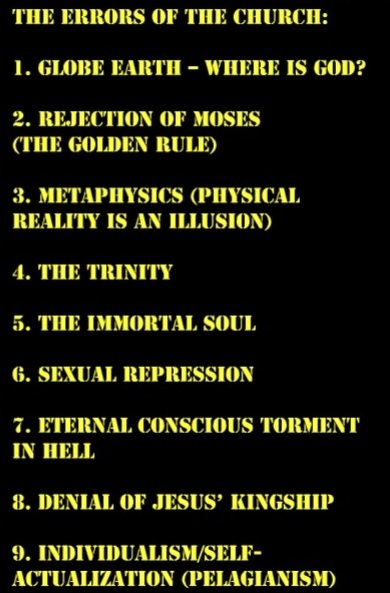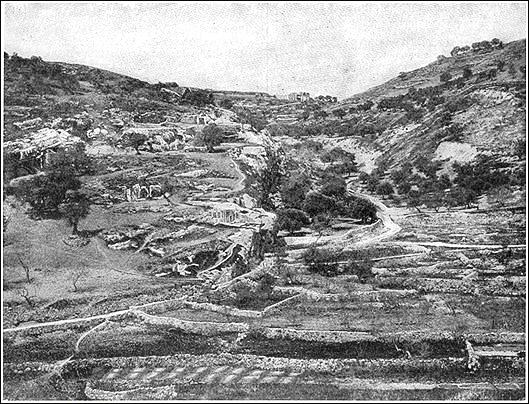Greetings. In this series, I'm going to provide some history, and a refutation of the Nicene Christian faith, as provided by the ecumenical councils. The two main topics that Nicene Christianity gets wrong are Greek metaphysics (the idea that there's something that transcends material reality, which breeds hatred for the material world), and the rejection of the Mosaic Law which Jah himself provided, for Roman law, and Canon law for the hierarchy of the church. Today I will be addressing the former, which is what bred many historical Christian doctrine (for example, round earth geocentrism, which is completely bonkers). What I wish to do here is to defend Jah's Law, and to defend the Reformation against the constant assault of metaphysicians. It's true that the Reformation (as it was during the 16th century) started due to both the rise of the Lollards of Wycliffe and the Hussites of Jan Hus in Czechia, but also Hebrew learning during the Renaissance with folks such as Johann Reuchlin. It had thus erected a fortress against popery, and against the metaphysicians. Credit to Drake Shelton who is called the Southern Israelite for the image below.

In the 2nd century, early proselytes to the Messianic faith with a philosophical background, such as Justin Martyr and Origen had sought to combine their Platonic philosophy with the framework of the Bible, which resulted in the Hellenistic background of Christianity today. This philosophy couldn't be further from the truth.
Christians usually say that God is a spirit, and not a fixed, physical entity. This couldn't be further from the truth, because in the entire Old and New Testament, there are no established metaphysics. The words that are commonly mistaken to mean soul are ruach, and neshama.
Ruach simply means "spirit", as in Ruach HaKodesh (the Holy Spirit). It has nothing to do with this Christian conception of a spirit. Referring to NASB, it quite literally means air, breath, "spirit", as in, emotions, temper, HEART, even temperature It of course means life. To quote from it:
"air (2), anger (1), blast (2), breath (31), breathless* (1), cool (1), courage (1), despondency* (1), exposed (1), grief* (1), heart (1), inspired (1), mind (3), motives (1), points (1), quick-tempered* (1), side (4), sides (2), Spirit (76), spirit (127), spirits (3), strength (1), temper (2), thoughts* (1), trustworthy* (1), wind (98), winds (7), windy (2), wrath (1)."
Neshama on the other hand is more-or-less what's considered the soul, yet it too has nothing to do with the Christian conception of the soul. It means the same thing but in a more biological than emotional sense. Neshama is literally the breath of life, how Jah had gave it to Adam. To quote again from NASB:
"blast (2), breath (15), breathes (1), life (1), persons alive (1), spirit (2), who breathed (3)."
In not only the Hebrew Bible, but also in the related mythology of the Mesopotamians, the soul is associated with air. Jah had breathed into Adam's nostrils the breath of life, clearly a material animating force that we all have. This is related to Enki in Sumeria doing something similar in the Mesopotamian creation account. So where does the eternal soul doctrine come from? Obviously it's what Socrates believed in, and in-turn it came from the Hellenic mysteries rooted in Babylonian and Egyptian tradition, in which the Greek philosophers were educated, but how did it come to Christianity? It comes from Hellenistic Judaism, which sprung from the Sadducees and found special ground in Alexandria. Philo, an Alexandrian jewish aristocrat (brother of Alexander the Alabarch, a court jew who served for the Flavians) didn't bring Plato to the jews, but he definitely had a lasting impact on it. For him, Judgement Day and the resurrection of the dead wasn't glorious indeed, but what was was Plato's soul doctrine. Alexandrian jewish texts in-general, even before Philo had professed this belief in the eternal soul, such as the Wisdom of Solomon 2:23, IV Esdras, and even in the Slavonic Enoch.
Contrary to popular belief, the earliest Judean converts to the Messianic faith after Jesus were called the Nazarenes, and they were wholly Hebraic, not believing one bit of Greek metaphysics, and following the Law. It was in-fact in Alexandria where Gnosticism would be established, and where Platonism and Christianity would collide together. Earlier mentioned Origen was a big offender in this, he was from Alexandria, and was a Neoplatonist. Justin Martyr while not a Neoplatonist was a Hellenist. These folks were corrupters, not fathers, indeed even the Orthodox church itself had condemned Origen under Justinian.
This thus repudiates and settles down the eternal soul doctrine that the Christians have promoted since before the Nicene council. Now, the eternal soul doctrine is the basis for the eternal suffering in hell doctrine. Again, this is also false. First of all, the word commonly translated as "hell" in the Old Testament isn't really hell at all. It's in-fact Sheol, which is equivalent to the Greek concept of Hades, or the Germanic concept of Hel (meaning literally covering). As per Job 10, Sheol has nothing to do with hell at all. It's simply the process of death, being buried, and biting dust in the underworld, until they are resurrected for Judgement Day. Abraham's Bossom is a word commonly used to refer to Sheol or death. Everybody who dies and is buried thus goes to Sheol, whether saved or unsaved, righteous or not. Yes, a perfect example of this is the state that Jesus was in after his burial but before his resurrection, he never went to hell at all.
What is actually hell is Gehenna, or the Lake of Fire, which Jesus uses in the New Testament. Gehenna is the Valley of Hinnom, and it was a permanent garbage dump near Jerusalem, in which the Judean kings partook in child sacrifice to Moloch.

Let's see what happens when people go to hell in the Old Testament:
Malachi 4 King James Version (KJV)
1 For, behold, the day cometh, that shall burn as an oven; and all the proud, yea, and all that do wickedly, shall be stubble: and the day that cometh shall burn them up, saith the Lord of hosts, that it shall leave them neither root nor branch.
2 But unto you that fear my name shall the Sun of righteousness arise with healing in his wings; and ye shall go forth, and grow up as calves of the stall.
3 And ye shall tread down the wicked; for they shall be ashes under the soles of your feet in the day that I shall do this, saith the Lord of hosts.
This is a reference to the later Lake of Fire. You do literally burn in hell, and get your body destroyed in the fire.
In Ezekiel:
Ezekiel 28:18-19 King James Version (KJV)
18 Thou hast defiled thy sanctuaries by the multitude of thine iniquities, by the iniquity of thy traffick; therefore will I bring forth a fire from the midst of thee, it shall devour thee, and I will bring thee to ashes upon the earth in the sight of all them that behold thee.
19 All they that know thee among the people shall be astonished at thee: thou shalt be a terror, and never shalt thou be any more.
In-fact, in the New Testament:
Matthew 3:12 King James Version (KJV)
12 Whose fan is in his hand, and he will throughly purge his floor, and gather his wheat into the garner; but he will burn up the chaff with unquenchable fire.
Thus, we can settle that the eternal hell doctrine isn't true either.
Now, back to the soul doctrine. The papists and Nicene Christians in general believe in this idea of imago dei, that not just all men, but women are made in the Image of God. This is incredibly untrue. For it is written:
Genesis 1:27 King James Version (KJV)
27 So God created man in his own image, in the image of God created he him; male and female created he them.
He, him, these are masculine pronouns being used, and don't try to play semantics with me, the original word used in Hebrew is zakar, which is itself a masculine pronoun being used. It isn't saying that women are created in imago dei, but that man is, and that God, had created women.
So it was Adam that was created in the image of God, and thus man is the image and glory of God, women was created from man to be his companion. This explains why all angels are also male. Paul of Tarsus reiterates in his Epistle:
1 Corinthians 11:6-7 King James Version (KJV)
6 For if the woman be not covered, let her also be shorn: but if it be a shame for a woman to be shorn or shaven, let her be covered.
7 For a man indeed ought not to cover his head, forasmuch as he is the image and glory of God: but the woman is the glory of the man.
So the Adamic man definitely is the image of God. Not women too, and definitely not a soul. We physically are in God's image.
Now, onto sin and salvation, this forms a sort of transition between my attack on metaphysics and my defence of the Law of Moses. Going by 1 John 3:4, sin by definition is a transgression of the Law. The original sin was when Adam and Eve ate from the tree of knowledge of good and evil, the only commandment at the time was not to eat from it. Now, contrary to what many Gnostics think, this isn't some hidden esoteric knowledge about creation or about becoming God, the knowledge of good and evil is what led to all the sins that the Law forbids or commands what to do against, that's why it's called the KNOWLEDGE OF GOOD AND EVIL, i.e. the knowledge of sin, because Adam and Eve didn't have sin, so they didn't know sin. Put my rant against Gnostics to rest for now. The doctrine of salvation is also really clear. In ancient Israel, animals were sacrificed to atone for peoples' transgressions against the Law, and in a symbolic matter, their blood was later sprinkled in the temple. This is exactly what is meant by Jesus coming as a lamb, and us being sprinkled in his blood, before resurrecting. So now instead of paying for animals to atone for our sins, we can now just pray to Jesus's sacrifice and be saved. Jews today still take part in animal sacrifice, however they're not in the same way as they used to be. Shaking chickens above their head isn't how the Hebrews had done it.

What traditional Christian metaphysicians have taught (until the Reformation, where the Protestant confessions clearly do define sin as transgression of the Law) is not that sin was simply transgressing the Law, but that it was going down the metaphysical chain of being away from the Nous, away from the Monad. Clearly Platonic influence at hand here. Similarly the doctrine of salvation as taught by traditional Nicene Christians isn't that Jesus sacrificed himself as a lamb (based off the Israelite animal atonement) so that he died in place for our sins, but is the doctrine of Theosis. Essentially that the Logos hypostatises with the part of mankind that are saved, while the ones falling down the chain of being away from the Nous are sent to eternal torment in hell. Essentially identical to the Neoplatonic concept of reunification with the One to transcend duality. Absolutely disgusting doctrine that is an innate perversion of the very meaning of the Gospel.
So today, I have covered the eternal soul and why it's wrong, eternal conscious torment in hell and why it's wrong, what imago dei really is, what sin and salvation are and why the Christian church got it wrong. This forms a transition to my next attack on the teachings of the church - their rejection of the Law of Moses, for Roman law.
The mosaic law was fulfilled in Jesus' death on the cross and his resurrection. There's no need for a priesthood to sacrifice animals for the sins of the people. The Jewish Law has passed away along with it's 613 separate rules.
The Evangelical Christian church doesn't get anything wrong when it comes spiritual truth.
You're wrong about hell. Soul death is a common heresy among the cults like the Jehovah's Witnesses. It's clear that people in hell are tormented forever.
(Luke 16:19-31 NIV) "There was a rich man who was dressed in purple and fine linen and lived in luxury every day. {20} At his gate was laid a beggar named Lazarus, covered with sores {21} and longing to eat what fell from the rich man's table. Even the dogs came and licked his sores. {22} "The time came when the beggar died and the angels carried him to Abraham's side. The rich man also died and was buried. {23} In hell, where he was in torment, he looked up and saw Abraham far away, with Lazarus by his side. {24} So he called to him, 'Father Abraham, have pity on me and send Lazarus to dip the tip of his finger in water and cool my tongue, because I am in agony in this fire.' {25} "But Abraham replied, 'Son, remember that in your lifetime you received your good things, while Lazarus received bad things, but now he is comforted here and you are in agony. {26} And besides all this, between us and you a great chasm has been fixed, so that those who want to go from here to you cannot, nor can anyone cross over from there to us.' {27} "He answered, 'Then I beg you, father, send Lazarus to my father's house, {28} for I have five brothers. Let him warn them, so that they will not also come to this place of torment.' {29} "Abraham replied, 'They have Moses and the Prophets; let them listen to them.' {30} "'No, father Abraham,' he said, 'but if someone from the dead goes to them, they will repent.' {31} "He said to him, 'If they do not listen to Moses and the Prophets, they will not be convinced even if someone rises from the dead.'"
"The mosaic law was fulfilled in Jesus' death on the cross and his resurrection. There's no need for a priesthood to sacrifice animals for the sins of the people. The Jewish Law has passed away along with it's 613 separate rules."
Matthew 5:17-18 refutes this premise. Jesus said that not one jot or tittle shall come from the Law until earth and heaven pass, until all is fulfilled. Now we know that not all prophecy is fulfilled yet. We don't live in heaven, we're still in the sinful earth. Thus, the Mosaic Law still applies. It has not been "fulfilled" yet.
"The Evangelical Christian church doesn't get anything wrong when it comes spiritual truth."
Refuted already.
"You're wrong about hell. Soul death is a common heresy among the cults like the Jehovah's Witnesses. It's clear that people in hell are tormented forever."
Jehovah's Witnesses get just as much right as they get wrong so that they could be used as a strawman for anybody going against the church.
"(Luke 16:19-31 NIV)"
That's a parable, not a literal description of what happens when you die. We know this because hell/Gehenna comes after the Day of Resurrection, not right when you die. Moreover, the term for hell isn't Gehenna here. It's Hades, i.e. just death (this is what Jesus meant when he said to Peter that the Gates of Hades would not prevail against his church, that they will inherit eternal life).
I'm no Jehovah's Witness, but this article does good in refuting the presumption that Lazarus went to hell in Luke 16.
https://defendingjehovahswitnesses.blogspot.com/2013/08/luke-1619-31-parable-that-does-not.html